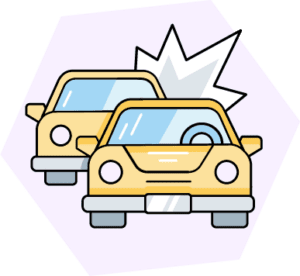Does Car Insurance Cover Towing?
In many car insurance policies, towing is not covered unless you specifically add on roadside assistance coverage. That means towing costs come out of your pocket when you have a breakdown. Learn more about how insurance for towing works and how you can add it to your plan.
Table of Contents
Taking Care of Breakdowns On the Road
There are about 69 million breakdowns on U.S. roads each year. These breakdowns cost American drivers over 260 million hours of wasted time annually. Further, with the average tow costing on average $125, the financial burden can be impactful.

There are many reasons why you might require a tow. For example, maybe you suffered a couple of flat tires and only have one spare in your trunk. Or perhaps you have a dead battery that’s left you stranded on the side of the highway without a way to recharge. Even well-maintained cars can be left inoperable if they run out of gas or experience transmission trouble.
Since you never know when your car might break down, having towing included in your car insurance can help you from a large unexpected expense. While towing is not included in standard auto policies, you can purchase add-ons to cover it.
How Does Insurance for Towing Work?
Many choose liability-only car insurance policies because they’re cheaper and meet state minimum requirements. These provide coverage for the damage they cause in an accident but do not cover other expenses, such as towing. However, other types of policies, such as collision or comprehensive, sometimes offer this benefit. It’s also included if you specifically add on roadside assistance.
How this coverage works varies depending on your plan. Some insurance providers have their own network of tow truck drivers they send to you if you break down. Others may allow you to call your own tow truck driver and then reimburse you later. Some also have limits on how far you can be towed. Check your plan’s specific rules, so you know what to expect.
Roadside Assistance
Roadside assistance is a type of coverage you can buy from automotive clubs or insurance companies. It’s meant to provide help when your vehicle breaks down or you experience minor issues on the road. It covers things like jump starting a dead battery, changing a flat tire, delivering fuel, and unlocking a car.
Usually, roadside assistance providers can get a car up and running again. But if your vehicle cannot be fixed on the spot or is not safe to drive, the provider can tow you to the nearest mechanic or the location of your choice. This can occur if the car is severely damaged, mechanically disabled, or in an accident.
Comprehensive Coverage
Comprehensive coverage is a type of insurance that covers damage to your vehicle from noncollision events. This includes scenarios like theft, vandalism, fire, natural disasters, and falling objects, such as a tree falling on your car.
Comprehensive coverage sometimes includes towing services after a covered event. For example, towing might be covered if a tree falls on your car. However, the car needs to be completely inoperable, so if the tree only left a few dents, you likely are not eligible for a tow.
Also, comprehensive coverage usually does not cover towing for mechanical breakdowns or accidents. For that, you might need roadside assistance or collision coverage.
Collision Coverage

Collision coverage is another type of car insurance that covers damage to your vehicle after a crash, no matter who’s at fault. If your car is damaged in a covered collision event, collision coverage pays for repairs or even a vehicle replacement minus the deductible.
Regarding towing, if your vehicle is severely damaged in a collision and cannot be driven safely, the insurance policy usually covers the cost of towing it to a repair facility or a location of your choice. It does not include towing coverage for breakdowns. However, check your policy to understand the specific towing coverage limits and conditions.
Limitations for Towing Covered by Insurance to Keep in Mind
Some insurers may have limitations on towing, such as:
- Distance limit: Some insurers only cover towing up to a certain number of miles from the breakdown location. If the towing distance exceeds this limit, you may have to pay for the extra distance.
- Towing destination: Insurance companies sometimes require you to visit their network’s nearest repair facility or preferred garages. You might have to pay additional fees if you want your car towed to a specific repair shop or location.
- Towing for trailers: Towing coverage sometimes does not include trailers or other attached vehicles.
- Towing frequency: Some insurance policies may limit how often you can get towed during a specific period.
Alternatives to Insurance for Towing
Insurance is not the only way to get towing benefits. There are plenty of other options available, including:
- AAA (American Automobile Association): This is a membership based organization with annual premiums that offers standalone roadside assistance, including towing. AAA is a standalone service you can call for help, and using it for towing won’t typically result in insurance claims or impact your insurance rates.
- Credit card benefits: Some premium credit cards provide separate roadside assistance, including towing, as a cardholder benefit, but terms and coverage vary, and reimbursement may be required. You do not typically have to pay a premium to access these benefits.
- Manufacturer’s roadside assistance: Some vehicle manufacturers offer complimentary services for limited periods after you buy a new car. During this time, towing for mechanical breakdowns and warranty-related issues may be covered.
Putting It All Together
It’s not common to have towing covered by insurance. However, you may be eligible for towing in specific situations if you have comprehensive, collision, or roadside assistance coverage. Comprehensive insurance may cover towing after a noncollision event, while collision might foot the towing bill after an accident. Roadside assistance insurance towing coverage kicks for breakdowns. To know if you have any towing coverage, read through your insurance policy or speak with a trusted insurance agent. If you do not, consider adding roadside assistance to your policy or from an auto club.
